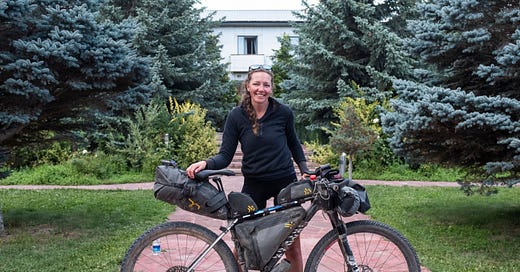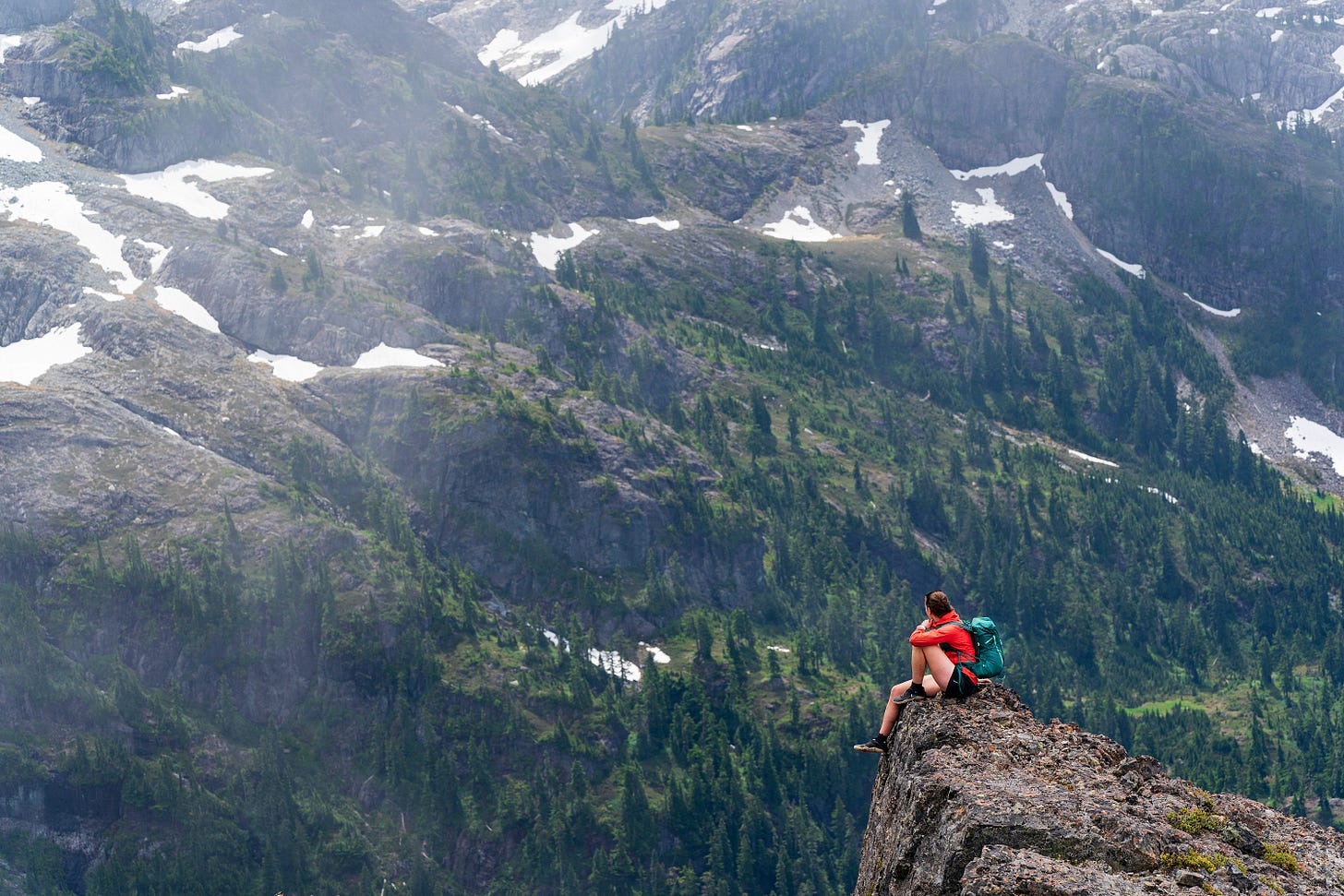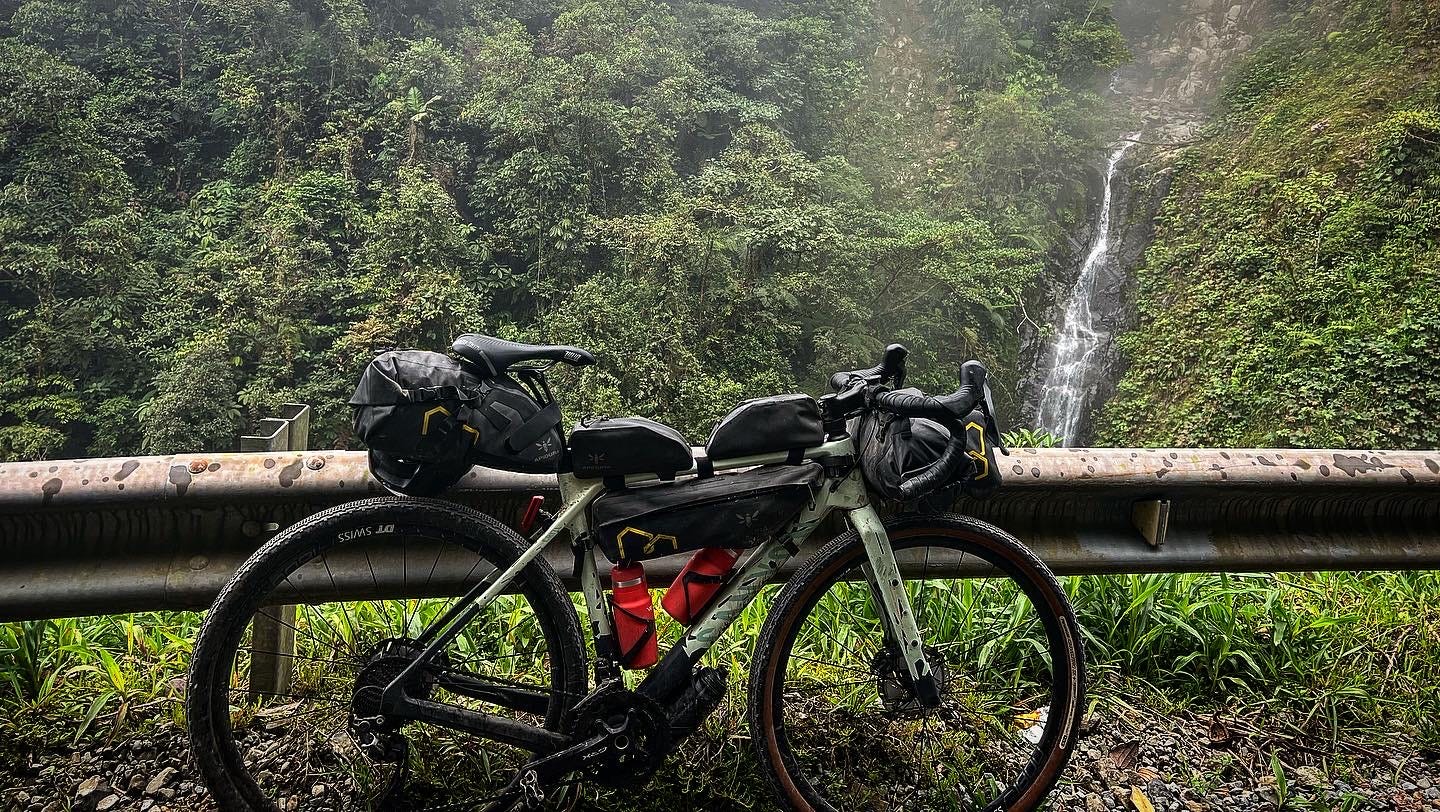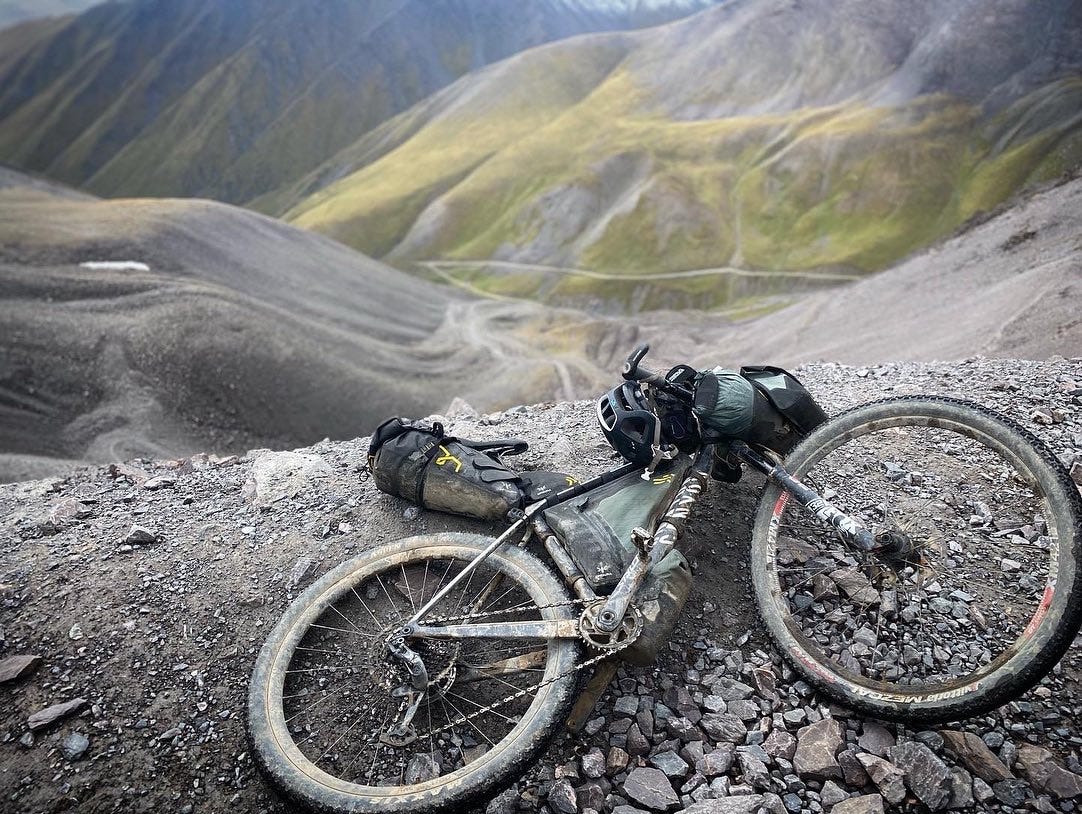Returning to Ultras
The long read: why I didn't finish a race again for so long after my last big win.
If you would like to listen to this post instead of reading, head here.
It’s been nearly two and half years since I finished an ultra. I did at least leave with a bang - my second win on the Silk Road Mountain Race. From that race, I left with my kalpak1 directly to Cluj Napoca to run the 430km of the Romanian Alps to complete my solo running project2, with only 12 days in between the ride and the run. I had a deadline for my book manuscript and I was making a living off of my sponsorship for these projects. I was in a very good place. I was keen to keep this momentum going as long as I could. I returned to Squamish after these two very big ultras, one on bike and one on foot, and was determined to get back to training immediately. My muscle mass had deteriorated beyond recognition and by the time my flight landed, I felt… unfit. Too many celebratory pizzas, I told myself. I had been noticeably thin at the finish line of the SRMR (as everyone does), but after a stop in London to see my publisher I already felt fatter than when I started. I needed to quickly get back to strength training. And I had struggled a lot in the last few days of my run, so back to more dedicated running. There was a hill near where I lived that I had only once managed to run to the top of without stopping - I would need to do that weekly, at least. And my body was a mess, so yoga every night. Unless it’s one of the nights I do my late rides.
I was living by myself and working from home, and we still had a fair amount of pandemic restrictions - all to say that I was largely unsupervised in my habits. It was very normal for me to do three sessions a day - morning ride, midday gym, then a harder workout on the trails in the late afternoon. Maybe a walk thrown in to ‘recover’. On weekends I still did longer endurance days, but somehow managed to be at the gym five or six days a week. I had been flirting with a vegan diet - a very aspirational ‘clean’ version that was extremely trendy at the time - and made the full commitment that winter. Now, on top of my training hours, my job, and trying to finish a book, I was pretty much constantly cooking, as everything had to be made from scratch in order to be Good.
I was really loving the life I had built, and it looked ever so good on paper. The book manuscript went in, work was going well, and I was mountain biking and trail running and skiing and lifting all day, every day, in one of the most beautiful (and expensive) places on earth. The Dream. But, there was a mounting frustration that I was slowing down. My max run distance just couldn’t get over the 12k mark. I told myself at first that it was just recovery from that very hard run in Romania, where I did about a marathon a day, but I just couldn’t get running back. My paces got slower and slower on my watch, and the distances dwindled until I had to be happy with a 5k as my hard run. Of course, if I could only run a 5k, then I would run another one later to make up the distance. Never take a rest day - 5ks don’t deserve rest days. They’re not hard enough. Just keep training. Three times a day, every day. Then eat lentils. In my only defence, I was sleeping A LOT. In hindsight, I was burnt out. Afternoon naps were not a beloved luxury, they were essential, often falling asleep on top of my laptop by mistake.
It all finally caught up in February, half a year after my SRMR win. I rode across the Colombian Andes on my gravel bike, a journey I truly cherished and had the most wonderful time. I was doing the mileages I was used to and feeling great about myself, until nearing the end when I couldn’t push the pedals at all. The tank went empty and no matter what I did, the red light would not come off. For a couple of weeks, I could barely manage going for even just a hike. Pain and fatigue shot through my legs and arms all day, every day. I wanted to use the extra time to get caught up on work, but my brain felt empty, too.
In my troubleshooting, I tried using a calorie calculator to see how my virtuous diet was going. I was probably just low on protein, as that was the answer to literally everything on the internet that season. I learned that my clean eating diet barely scraped more calories than my training (*I have taken the real numbers out to protect anyone with a current ED). My jaw hit the floor when I thought back to how long I had been doing this for. I felt I had been eating a lot, but in reality, decades of dieting had taught me too many tricks to remove calories from food until I was barely getting any.
I spoke to a doctor, leading her to the conclusion that I had RED-s3. I didn’t really need to be officially diagnosed, I just needed some guidance on where to go next and hoped she would order some blood work. (Important side note, this doctor visit happened over a phone call, thanks to changes following covid. The doctor did not see my size or make judgements on how I presented, she only had my story to go on. I say this because eating disorders largely go undiagnosed unless the person in question is severely underweight, which only happens in about 6% of ED cases. I’m just adding this part in to help anyone who might be resonating at this point and want professional guidance, or perhaps have already sought guidance but were wrongly dismissed due to their current weight4).
The doctor wasn’t that interested in RED-s. As I say, it was obvious. I hadn’t even bought tampons in years. But she was adamant that I had an eating disorder that I would need to address - an eating disorder that I had clearly nurtured for over a decade. This wasn’t going to be a simple fix.
To receive a message like that in your 30s is like a blow to the stomach. In one sentence my entire self-confidence was knocked out of my body. An eating disorder? Isn’t that for teenagers? Is she trying to imply that I don’t know how to EAT???
Of course, I knew I had a lot of problems around food. I had been obsessed with my weight, and never satisfied (save for two or three extreme weight loss seasons that had been ‘successful’) since the age of around 14. That’s more than half of my life obsessing over food and calories and following countless diet trends, including two rounds of Weight Watchers despite not even being overweight at the time (they’ll take anyone). Problems, yes, but full-blown disorder? Harsh.
If you’ve never been there, it’s easy to assume that ED recovery means simply to start eating more. And I really did apply myself to that attempt. But weaning myself off of vegan-clean-eating was a lot harder than I predicted. My mind screamed at anything that wasn’t on the Good List. I could only eat bread if it was either homemade or eye-wateringly expensive (if you’ve lived in Squamish, you know). That’s just one example of many. Entire food categories were out of the question, and I still needed to prepare absolutely everything from scratch. Yet I had to nearly *double* my intake somehow. Meanwhile, taking a step back from training, meaning I couldn’t do my usual “it’s okay, I’ll burn this off” approach to eating.
The body does not instantly respond to any of this. Again, I did this for more than half of my life, since the very beginning of puberty, and my poor system has assumed I’ve been living in a famine ever since. I went out and bought cute oversized black clothing to try and feel more comfortable with the constant bloating (this is genuinely one of my top tips for recovery), and had to keep antacids at hand every day as my body literally repulsed the intake. Still, I dedicated myself to the program of physical recovery. The carrot hanging on a stick for me was a return to ultra racing. Winning the SRMR had been one of the highest feelings in recent memory, I just knew that if I got myself strong, I could get back to that feeling. This carrot was enough to keep me sitting through uncomfortable amounts of food and testing my beliefs with foods that were on the Bad List. As they say with anything hard, always know your Why.
Physical recovery is Step One, and, hard as it is, it’s the easiest part. My brain needed a full rewiring. I already had a lot in place for mental health, like journaling and yoga, but I had always ignored my feelings towards my body in these practices. Once I started applying The Work to them, so many dots became connected. Everything came back to the body. And I mean everything. Every little thing since I was 14 years old fell under a tinge of hating my body. This was going to be far more work than I had anticipated.
-
This February, on the final day of the Race Around Rwanda, as we came off the last gravel segment and had a mere few hours of road cycling left to reach the finish line, my mind drifted back over these two and a half years of work. Had it really been that long? I could hardly believe it had taken so much time and effort, but looking back over how much I had to untangle in myself alongside how hard my body had to work to come back online (my period has been regular for 14 months now), it doesn’t seem so unrealistic. In many ways, it felt like lost time and my anxiety that I would lose both my career and my community was keeping me up at night for too long now. There had been a total loss of identity in all of that time trying to destroy and then rebuild myself.
At our last resupply stop, I sat outside a dusty shop with a cold coke and stale muffin telling Andrew, who I’d cycled most of the event with, what finishing would mean to me, and was suddenly overwhelmed by the emotion as I heard the words come out of my mouth - that I hadn’t been able to do something like this in two and a half years. All of my attempts to rush back to ultra sport had been serious dents in my confidence - one DNF and a large handful of DNS’s to events that I signed up for in earnest, only to realise weeks beforehand that I still wasn’t ready. And finally, steady as she goes, I had made it around one race course. I had played it pretty safe, not even contemplating racing hard, knowing that I needed a finish line more than anything. I had promised myself that a Lanterne Rouge5 would be acceptable if it meant I could finally say I had finished an ultra. Finally see my wee name printed on the finishers list, no matter how far down you had to scroll. No DNF or DNS, but a GC finishing time.
We did better than Lanterne Rouge - a respectable 4.5 days and third female - and I cried happy tears for about another 4.5 days afterward. I’m back. Finally. I’m fucking back. Except, not ‘back’. Because I’m a completely different, healthy, happy racer this time.
Traditional Kyrgyz hat and the only prize for winning.
https://www.runnersworld.com/uk/health/a33589189/red-s-relative-energy-deficiency-running/
Loving title for last place













Thanks so much for sharing more of this. I've been following you since the early mountain range runs, but the honesty about your health is, to my mind, at least as inspirational. I'm in an analogous position - having had to take nearly 5 years away from the mountains for reasons connected with mental health, trauma and exhaustion (I've had an eating disorder as well, but that's a decade in the past). I'm finally, I think, reaching the stage where I'll be able to try a something big again this summer, and it feels like I may be on the cusp of getting my life back. (I've been writing about that across at 'Beyond The Mountain', if you're interested.) Really glad you're feeling able to share more of this. It really helps change the messages.
Thank you for sharing this. I do hope it inspires others who are suffering in similar ways. I am so happy to hear you are better! Looking forward to reading about your fabulous adventures in the coming years! Keep at it!